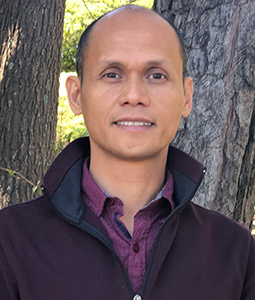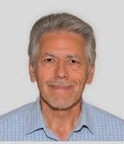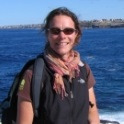Dr. Mohammed Baalousha, Associate Professor

Dr. Mohammed Baalousha obtained a BSc in Civil Engineering from the Islamic University of Gaza, Palestine in 2001. After that, he moved to France where he completed a Masters degree in Applied Mechanics from the University Bordeaux 1 in 2002 and a PhD in Environmental Biogeochemistry entitled “Environmental role of colloids as carriers of trace elements” in 2006. Between 2006 and 2013, he undertook a variety of postdoctoral research role at the University of Birmingham, UK in the area of the Environmental Nanoscience. He moved to the University of South Carolina as Assistant Professor in Environmental Nanoscience in January 2014. Dr. Baalousha is a recipient of the 2016 NSF CAREER award. Dr. Baalousha’s research interests are interdisciplinary in nature including understanding the role of natural nanoparticles as carriers of trace contaminants and understanding the fate, behavior and biological effects of manufactured nanomaterials in the environment. In particular he is interested in:
- Understanding the environmental and human health effects of nanomaterials
- Quantifying the environmental exposure to nanomaterials in the environment
- Developing analytical tools and methodologies for analysis of nanomaterials
- Understanding the transformations, fate, behavior and effects of nanomaterials in environmental systems
- Understanding the interactions between nanomaterials and natural organic matter (NOM-corona)
Dr. Eric Vejerano, Assistant Professor
 Dr. Eric Vejerano obtained his B.S. in Agricultural Chemistry from the University
of the Philippines Los Banos in 1999. Prior to entering graduate school, he has devoted
his professional life as a teacher to a diverse group of students. In 2005, he decided
to return to chemistry elucidating the interaction between transition metal oxides
and combustion byproducts to understand the role of free radicals in the toxicity
of combustion-generated particulate matter. He earned his Ph.D. in Chemistry from
Louisiana State University in 2011. He spent four years of postdoctoral training at
the Department of Civil and Environmental Engineering at Virginia Tech investigating
the effect, fate, and transformation of engineered nanomaterials during combustion,
as well as the chemistry of evaporating aerosols. He joined USC in 2016 as an Assistant
Professor of Environmental Nanoscience. To date, his research interest has been geared
towards air quality which includes understanding: (1) the formation, fate, transport,
and transformation of incidental, engineered, and naturally-occurring nanoparticles
during thermal processing, (2) the interaction of nanoparticles with environmental
contaminants such as air toxics and persistent free radicals, and (3) the environmental
and health implications arising from these interactions.
Dr. Eric Vejerano obtained his B.S. in Agricultural Chemistry from the University
of the Philippines Los Banos in 1999. Prior to entering graduate school, he has devoted
his professional life as a teacher to a diverse group of students. In 2005, he decided
to return to chemistry elucidating the interaction between transition metal oxides
and combustion byproducts to understand the role of free radicals in the toxicity
of combustion-generated particulate matter. He earned his Ph.D. in Chemistry from
Louisiana State University in 2011. He spent four years of postdoctoral training at
the Department of Civil and Environmental Engineering at Virginia Tech investigating
the effect, fate, and transformation of engineered nanomaterials during combustion,
as well as the chemistry of evaporating aerosols. He joined USC in 2016 as an Assistant
Professor of Environmental Nanoscience. To date, his research interest has been geared
towards air quality which includes understanding: (1) the formation, fate, transport,
and transformation of incidental, engineered, and naturally-occurring nanoparticles
during thermal processing, (2) the interaction of nanoparticles with environmental
contaminants such as air toxics and persistent free radicals, and (3) the environmental
and health implications arising from these interactions.
Research Faculty
Dr. Kevin Dreher, Research Associated Professor
 Dr. Dreher received his B.S. degree in Chemistry from Villanova University, M.S. and
Ph.D. degrees from Pennsylvania State University. Dr. Dreher is also holds adjunct
appointments at the University of North Carolina (Curriculum in Toxicology), North
Carolina State University (Cell and Molecular Toxicology), and the University of North
Carolina Greensboro (Joint School of Nanoscience and Nanoengineering). Dr. Dreher
recently joined the Center for Nanoscience and Risk as a Research Associated Professor.
His research will pursue the education and application of nanoscience and nanotechnology
to address key environmental health issues including climate change and its impact
of agriculture, food quality, and economic sustainability. Dr. Dreher has published
over 70 peer-reviewed scientific papers, co-authored several federal and international
research strategy and regulatory documents related to the environmental, health, and
safety research needs and strategy for engineered nanomaterials and their applications,
and Organization for Cooperative Economic Development (OECD) harmonized testing guidelines
for evaluating the safety of engineered nanomaterials. Dr. Dreher has received numerous
awards during his tenure at the US Environmental Protection Agency including the Agency’s
highest awards such as: 1 Gold, 3 Silver, and 2 Bronze Service Medals for his research
in the areas of: air pollution health effects and safe sustainable chemicals. Dr.
Dreher serves on several national and international science advisory boards including
NIH’s NIEHS specialty study sections, 4 journal editorial boards, and review boards
for 29 toxicology journals. He is past Councilor of the Inhalation Specialty Section
of the Society of Toxicology and served as President, and co-founder of the Cardiovascular
Toxicology Specialty Section within the national Society of Toxicology. Over the course
of Dr. Dreher’s career he has mentored 25 individuals with degrees ranging from B.S.
to M.D. Dr. Dreher is a scientific advisor for the Alliances of Veterans and Families
Services, a 501c3 non-profit organization whose vision is to assist military veterans
to achieve a sustainable transition to family, civilian, and community life by providing
training, education, self-empowerment, and well-being as well as eliminating homelessness.
Dr. Dreher received his B.S. degree in Chemistry from Villanova University, M.S. and
Ph.D. degrees from Pennsylvania State University. Dr. Dreher is also holds adjunct
appointments at the University of North Carolina (Curriculum in Toxicology), North
Carolina State University (Cell and Molecular Toxicology), and the University of North
Carolina Greensboro (Joint School of Nanoscience and Nanoengineering). Dr. Dreher
recently joined the Center for Nanoscience and Risk as a Research Associated Professor.
His research will pursue the education and application of nanoscience and nanotechnology
to address key environmental health issues including climate change and its impact
of agriculture, food quality, and economic sustainability. Dr. Dreher has published
over 70 peer-reviewed scientific papers, co-authored several federal and international
research strategy and regulatory documents related to the environmental, health, and
safety research needs and strategy for engineered nanomaterials and their applications,
and Organization for Cooperative Economic Development (OECD) harmonized testing guidelines
for evaluating the safety of engineered nanomaterials. Dr. Dreher has received numerous
awards during his tenure at the US Environmental Protection Agency including the Agency’s
highest awards such as: 1 Gold, 3 Silver, and 2 Bronze Service Medals for his research
in the areas of: air pollution health effects and safe sustainable chemicals. Dr.
Dreher serves on several national and international science advisory boards including
NIH’s NIEHS specialty study sections, 4 journal editorial boards, and review boards
for 29 toxicology journals. He is past Councilor of the Inhalation Specialty Section
of the Society of Toxicology and served as President, and co-founder of the Cardiovascular
Toxicology Specialty Section within the national Society of Toxicology. Over the course
of Dr. Dreher’s career he has mentored 25 individuals with degrees ranging from B.S.
to M.D. Dr. Dreher is a scientific advisor for the Alliances of Veterans and Families
Services, a 501c3 non-profit organization whose vision is to assist military veterans
to achieve a sustainable transition to family, civilian, and community life by providing
training, education, self-empowerment, and well-being as well as eliminating homelessness.
Dr. Robin W. "Buz" Kloot, Research Associate Professor
 Buz started his professional life as a chemical engineer and spent 12 years in the
mining/mineral processing industry in Namibia, Africa. In 1999, he joined the University
of South Carolina and has been involved in various projects related to agriculture
and environmental quality. Buz is passionate about working directly with farmers on
soil health projects and research and how they can leverage the cover crop to improve
crop performance both in terms of yield and savings in inputs. Buz’s passion for
soils has moved him into the roles of storytelling through video. His documentary
“Under Cover Farmers” and his recent series on the “Science of Soil Health” and “The
International year of Soils”, available on line, are examples of his work and passion.
Buz is a research associate professor in the Environmental Health Sciences Department
at USC’s Arnold School of Public Health and holds degrees in Chemical Engineering
from the University of Cape Town in South Africa, and an MBA and PhD from the University
of South Carolina.
Buz started his professional life as a chemical engineer and spent 12 years in the
mining/mineral processing industry in Namibia, Africa. In 1999, he joined the University
of South Carolina and has been involved in various projects related to agriculture
and environmental quality. Buz is passionate about working directly with farmers on
soil health projects and research and how they can leverage the cover crop to improve
crop performance both in terms of yield and savings in inputs. Buz’s passion for
soils has moved him into the roles of storytelling through video. His documentary
“Under Cover Farmers” and his recent series on the “Science of Soil Health” and “The
International year of Soils”, available on line, are examples of his work and passion.
Buz is a research associate professor in the Environmental Health Sciences Department
at USC’s Arnold School of Public Health and holds degrees in Chemical Engineering
from the University of Cape Town in South Africa, and an MBA and PhD from the University
of South Carolina.
Adjunct Faculty
Dr. Simon Apte, Adjunct Professor
 Dr Simon Apte is a Senior Principal Research scientist at the Centre for Environmental
Contaminants Research, CSIRO Land and Water, Lucas Heights, Australia. He received
a BSc degree in Environmental Science and a PhD in environmental analytical chemistry
from the University of Southampton, UK. Simon has worked for CSIRO for over 25 years
and a large part of his work involves the investigation of water quality problems
throughout the Asia-Pacific region. This includes assessing the impacts of mining
and other developments on tropical locations. His research team investigate the speciation
and bioavailability of trace metals in aquatic systems. In particular, his laboratory specialises in the determination of trace elements at
ultratrace concentrations in environmental matrices including marine waters. Over
the last 10 years, his research has included studies that elucidate the environmental
transformations and toxicity of metal and metal oxide nanomaterials in aquatic systems.
This includes characterising the toxicity of nanomaterials to unicellular algae and
determining the solubility of various nanomaterials in aquatic systems.
Dr Simon Apte is a Senior Principal Research scientist at the Centre for Environmental
Contaminants Research, CSIRO Land and Water, Lucas Heights, Australia. He received
a BSc degree in Environmental Science and a PhD in environmental analytical chemistry
from the University of Southampton, UK. Simon has worked for CSIRO for over 25 years
and a large part of his work involves the investigation of water quality problems
throughout the Asia-Pacific region. This includes assessing the impacts of mining
and other developments on tropical locations. His research team investigate the speciation
and bioavailability of trace metals in aquatic systems. In particular, his laboratory specialises in the determination of trace elements at
ultratrace concentrations in environmental matrices including marine waters. Over
the last 10 years, his research has included studies that elucidate the environmental
transformations and toxicity of metal and metal oxide nanomaterials in aquatic systems.
This includes characterising the toxicity of nanomaterials to unicellular algae and
determining the solubility of various nanomaterials in aquatic systems.
Karen Coltrane, Adjunct Professor
 Karen Coltrane is a graduate of the College of William and Mary with a B.A. in economics.
After working her way through college as a supervisor at Busch Gardens in Williamsburg,
VA, she served as a bank officer with regional bank before returning to work for William
and Mary as the director of annual giving and a major gifts officer during the college’s
$150 million Campaign for the Fourth Century. Since leaving the college, she has served
in external relations positions for healthcare, national trade and membership associations
and human service organizations, and was the president and CEO of the Children's Museum
of Richmond for seven years. There, she oversaw the opening of four satellites, making
it the first children’s museum in the nation to have multiple locations. In 2015,
she became the CEO of EdVenture Children’s Museum in Columbia, SC. In addition to her 26 years of professional work for non-profits, she has also been
an active volunteer, including service as a regional president and member of the Board
of Trustees of Big Brothers/Big Sisters of America. She chaired the first Central
Virginia Heart Gallery, served on the Board of Trustees of the Henrico Education Foundation
and Richmond Regional Tourism and is currently a member of the Boards of Trustees
of MEDARVA. She was named the Central Virginia YWCA’s 2012 Outstanding Woman of the
Year in the category of Nonprofit Management. Her husband, Rick, works for the Federal
Department of Education in Washington, DC and their son, Sam, is a junior at the College
of Charleston.
Karen Coltrane is a graduate of the College of William and Mary with a B.A. in economics.
After working her way through college as a supervisor at Busch Gardens in Williamsburg,
VA, she served as a bank officer with regional bank before returning to work for William
and Mary as the director of annual giving and a major gifts officer during the college’s
$150 million Campaign for the Fourth Century. Since leaving the college, she has served
in external relations positions for healthcare, national trade and membership associations
and human service organizations, and was the president and CEO of the Children's Museum
of Richmond for seven years. There, she oversaw the opening of four satellites, making
it the first children’s museum in the nation to have multiple locations. In 2015,
she became the CEO of EdVenture Children’s Museum in Columbia, SC. In addition to her 26 years of professional work for non-profits, she has also been
an active volunteer, including service as a regional president and member of the Board
of Trustees of Big Brothers/Big Sisters of America. She chaired the first Central
Virginia Heart Gallery, served on the Board of Trustees of the Henrico Education Foundation
and Richmond Regional Tourism and is currently a member of the Boards of Trustees
of MEDARVA. She was named the Central Virginia YWCA’s 2012 Outstanding Woman of the
Year in the category of Nonprofit Management. Her husband, Rick, works for the Federal
Department of Education in Washington, DC and their son, Sam, is a junior at the College
of Charleston.
Dr. Marie-Noële Croteau, Adjunct Associate Professor
 I study the linkages between contaminant bioavailability and toxicity in aquatic organisms
exposed to metals, including colloidal metals and engineered nanoparticles. I develop
and refine methodologies that employ enriched stable isotope tracers to gain insights
into the physiological and geochemical processes influencing bioaccumulation and toxicity.
Results showed that all the studied metal forms are bioavailable and potentially toxic
to freshwater invertebrates, especially when taken up in the diet. Metal exposure
from food might trigger important environmental and human health risks.
I study the linkages between contaminant bioavailability and toxicity in aquatic organisms
exposed to metals, including colloidal metals and engineered nanoparticles. I develop
and refine methodologies that employ enriched stable isotope tracers to gain insights
into the physiological and geochemical processes influencing bioaccumulation and toxicity.
Results showed that all the studied metal forms are bioavailable and potentially toxic
to freshwater invertebrates, especially when taken up in the diet. Metal exposure
from food might trigger important environmental and human health risks.
Dr. Angela Halfacre, Adjunct Professor
 Angela C. Halfacre is professor of Earth and Environmental Sciences and Political
Science at Furman University in Greenville, South Carolina. She serves as the first
director of Furman’s David E. Shi Center for Sustainability established in 2008. Before
returning to Furman, her alma mater, in 2008, she spent 10 years at the College of
Charleston as a political science professor and director of the graduate program in
Environmental Studies. She was selected as the College of Charleston's 2008 Distinguished
Teacher-Scholar. She earned her Ph.D. from the University of Florida in 1997. At Furman, she teaches courses in environmental policy, wetlands policy, conservation,
food/farming and culture, sustainability science, environmental justice and research
methods. Halfacre also coordinates several curricular and co-curricular programs related
to sustainability on campus and in the local community. Her research and publications
examine public perceptions of sustainability issues (especially resource use and environmental
justice), community governance, and environmental decision-making primarily in the
American South.
Angela C. Halfacre is professor of Earth and Environmental Sciences and Political
Science at Furman University in Greenville, South Carolina. She serves as the first
director of Furman’s David E. Shi Center for Sustainability established in 2008. Before
returning to Furman, her alma mater, in 2008, she spent 10 years at the College of
Charleston as a political science professor and director of the graduate program in
Environmental Studies. She was selected as the College of Charleston's 2008 Distinguished
Teacher-Scholar. She earned her Ph.D. from the University of Florida in 1997. At Furman, she teaches courses in environmental policy, wetlands policy, conservation,
food/farming and culture, sustainability science, environmental justice and research
methods. Halfacre also coordinates several curricular and co-curricular programs related
to sustainability on campus and in the local community. Her research and publications
examine public perceptions of sustainability issues (especially resource use and environmental
justice), community governance, and environmental decision-making primarily in the
American South.
She has published several peer-reviewed journal articles, and has a University of
South Carolina Press book titled A Delicate Balance: Constructing a Conservation Culture
in the South Carolina Lowcountry (which examines environmental perceptions and associated
social movements in the Lowcountry region of South Carolina).
Dr. David Holbrook, Adjunct Associate Professor
 R. David Holbrook is a Research Chemical Engineer with the Surface and Microanalysis
Science Division at the National Institute of Standards and Technology (NIST) located
in Gaithersburg, Md, USA. Holbrook received a B.S. degree in biological systems engineering
and an M.Eng. degree in civil (environmental) engineering from Cornell University
(Ithaca, NY) and a Ph.D. degree in civil engineering from Virginia Tech (Blacksburg,
Va). He was a National Research Council Postdoctoral Fellow with NIST, where he focused
on developing and implementing surface sensitive analysis techniques for environmental
colloid and engineered nanoparticle characterization. He is a registered professional
engineer in North Carolina having spent six years in industry designing biological
wastewater treatment facilities, and he was awarded the Presidential Early Career
Award for Scientists and Engineers (PECASE) in 2009. Dr. Holbrook has authored or
coauthored over 40 peer-reviewed manuscripts on topics ranging from colloid-facilitated
transport of endocrine disruptors to detection and monitoring of anthropogenic activity
in natural aquatic systems, behavior of engineered nanoparticles, and microanalysis
of environmental samples.
R. David Holbrook is a Research Chemical Engineer with the Surface and Microanalysis
Science Division at the National Institute of Standards and Technology (NIST) located
in Gaithersburg, Md, USA. Holbrook received a B.S. degree in biological systems engineering
and an M.Eng. degree in civil (environmental) engineering from Cornell University
(Ithaca, NY) and a Ph.D. degree in civil engineering from Virginia Tech (Blacksburg,
Va). He was a National Research Council Postdoctoral Fellow with NIST, where he focused
on developing and implementing surface sensitive analysis techniques for environmental
colloid and engineered nanoparticle characterization. He is a registered professional
engineer in North Carolina having spent six years in industry designing biological
wastewater treatment facilities, and he was awarded the Presidential Early Career
Award for Scientists and Engineers (PECASE) in 2009. Dr. Holbrook has authored or
coauthored over 40 peer-reviewed manuscripts on topics ranging from colloid-facilitated
transport of endocrine disruptors to detection and monitoring of anthropogenic activity
in natural aquatic systems, behavior of engineered nanoparticles, and microanalysis
of environmental samples.
Dr. Mark Kindy, Adjunct Professor
 Dr. Mark Kindy is a biochemist/neuroscientist and Professor in the Departments of
Pharmaceutical Sciences, Neurology, Molecular Pharmacology and Physiology and Associate
Dean for Research and Innovation in the College of Pharmacy at the University of South
Florida and a Senior Research Career Scientist at the James A. Haley VA Medical Center
in Tampa,. FL. He received his BS from the University of Massachusetts in Zoology
and PhD from Boston University School of Medicine in Biochemistry. He was a postdoctoral fellow at the Salk Institute. Dr. Kindy started his faculty
career at the University of Kentucky School of Medicine in the Department of Biochemistry
and the Center on Aging. He was Professor and Associate Chair for Research in the
Department of Regenerative Medicine and Cell Biology at the Medical University of
South Carolina from 2002-2015. His area of expertise is neurodegenerative disorders,
animal modeling, mechanisms associated with diseases and regeneration of the brain.
Dr. Mark Kindy is a biochemist/neuroscientist and Professor in the Departments of
Pharmaceutical Sciences, Neurology, Molecular Pharmacology and Physiology and Associate
Dean for Research and Innovation in the College of Pharmacy at the University of South
Florida and a Senior Research Career Scientist at the James A. Haley VA Medical Center
in Tampa,. FL. He received his BS from the University of Massachusetts in Zoology
and PhD from Boston University School of Medicine in Biochemistry. He was a postdoctoral fellow at the Salk Institute. Dr. Kindy started his faculty
career at the University of Kentucky School of Medicine in the Department of Biochemistry
and the Center on Aging. He was Professor and Associate Chair for Research in the
Department of Regenerative Medicine and Cell Biology at the Medical University of
South Carolina from 2002-2015. His area of expertise is neurodegenerative disorders,
animal modeling, mechanisms associated with diseases and regeneration of the brain.